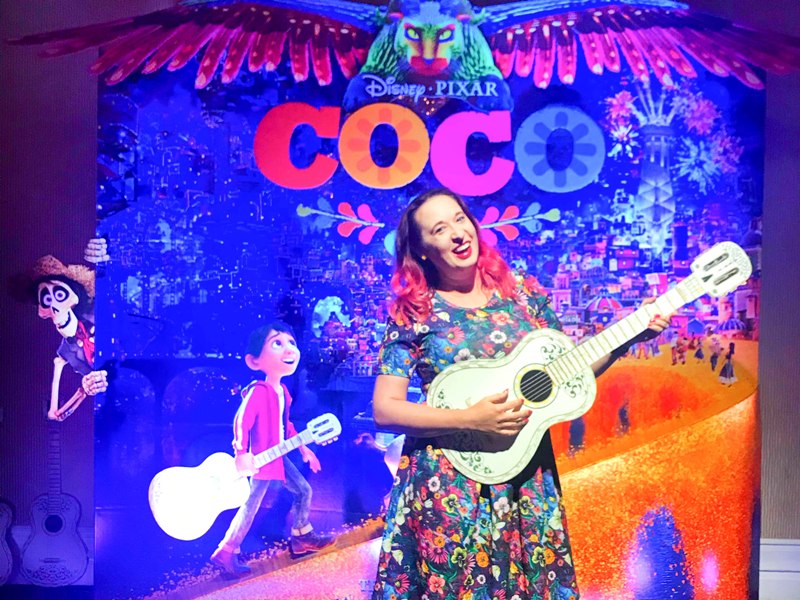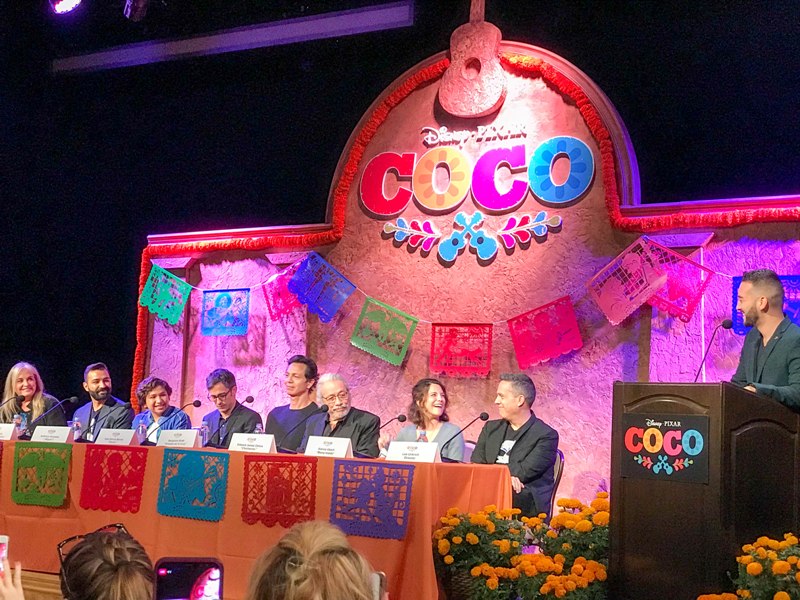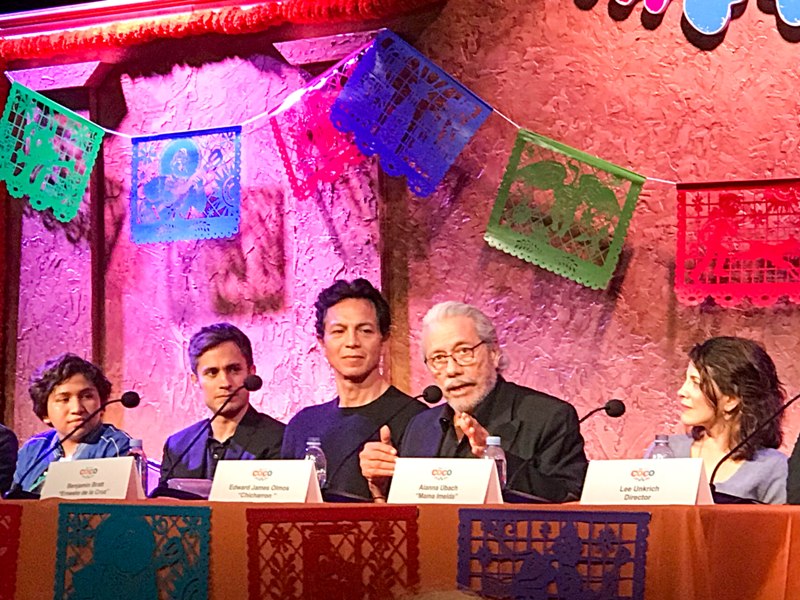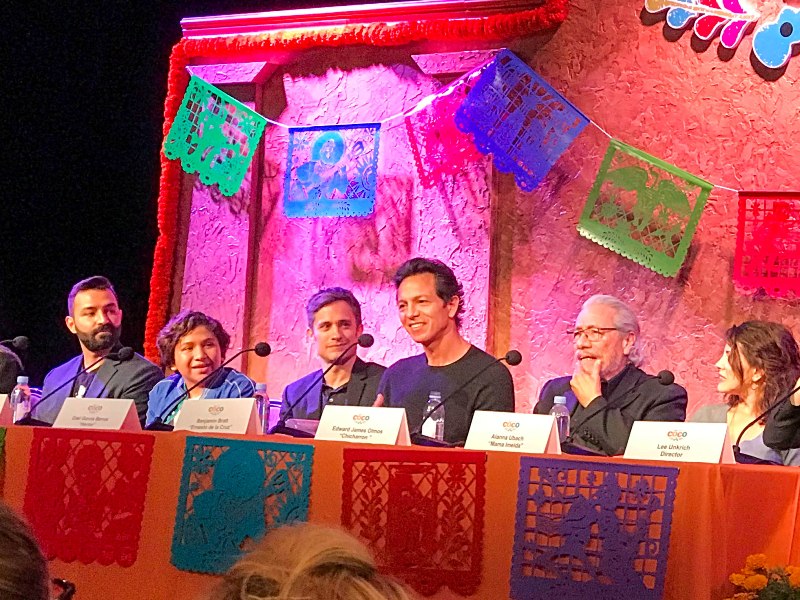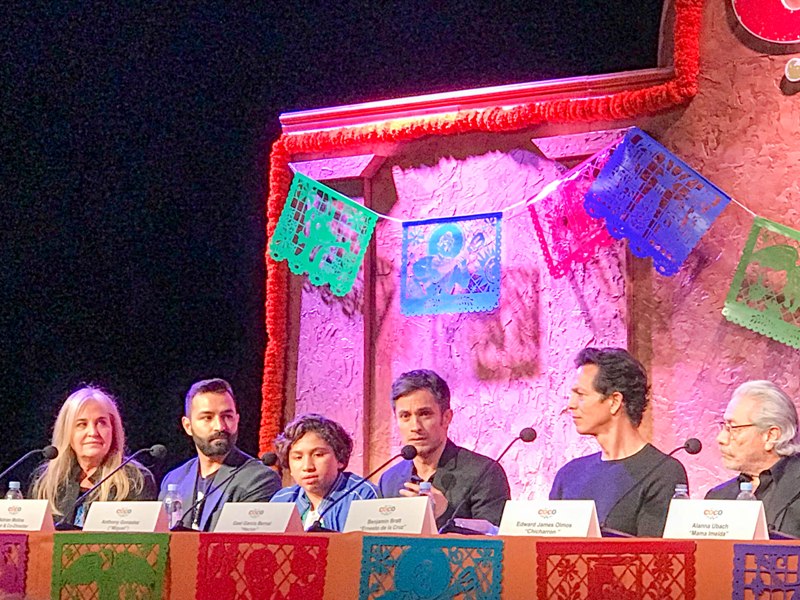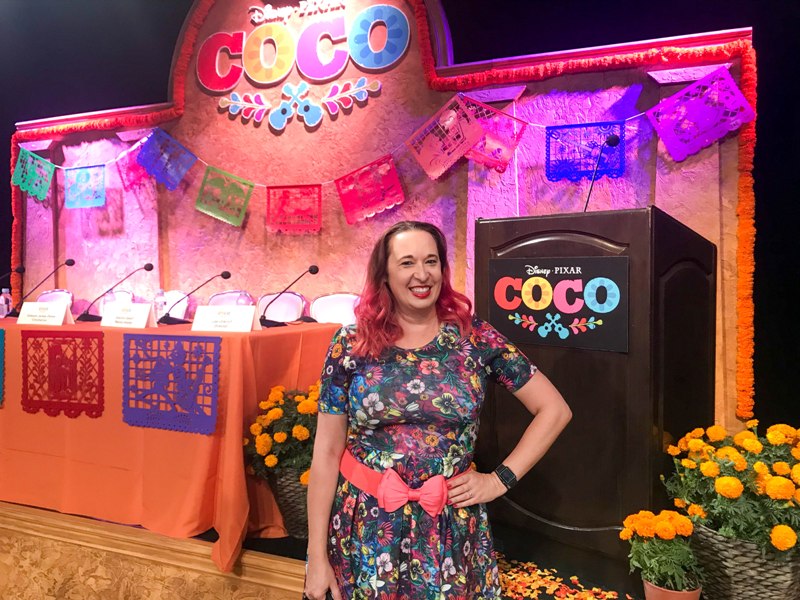This post contains affiliate links.
Last week I had the pleasure of attending a press event to celebrate the upcoming release of the Disney/Pixar film Coco! We got to hear from the amazing creators of the film, plus some of the voice talent, such as Benjamin Bratt and Edward James Olmos. It was a really fun afternoon, learning about the making of the film and why Coco is so important in today’s society. I hope you enjoy reading these interviews and learning about how the film was made!
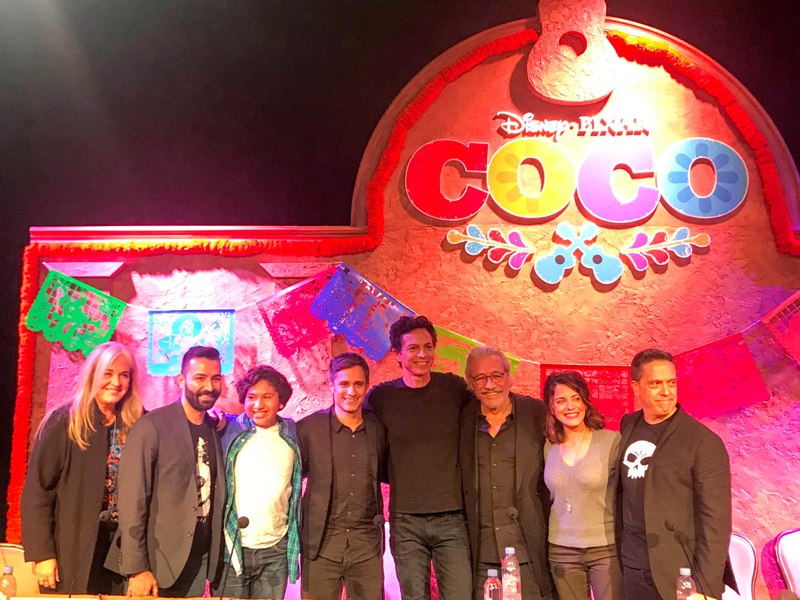
The creators and voice talent of Coco: (from L-R) Producer Darla K. Anderson, Co-Director Adrian Molina, Anthony Gonzalez (voice of “Miguel”), Gael Garcia Bernal (voice of “Hector”), Benjamin Bratt (voice of “Ernesto de la Cruz”), Edward James Olmos (voice of “Chicharron”), Alanna Ubach (voice of “Mama Imelda”), Director Lee Unkrich
Interviews with the Creators and Voice Talent of COCO
How did the idea of Coco come to be?
LEE UNKRICH (Director): Darla, and Adrian, and I all worked on Toy Story III together. And when we finished that film, I started to think about what was next, and I had a few different ideas that I was kicking around. And one of them was the idea of telling a story set against Dia dos Mortos. I had always been interested in the tradition and I spent some time doing some research and really trying to understand more than I already knew. And the more that I dug in, the more that I learned about how central family is to this celebration, and that Dia dos Mortos is, you know, is all about this obligation that we all have to remember our loved ones and to pass their stories along. And I just really started to see the potential to tell a unique story, to tell a story that could only be told in animation, that could be visually dazzling, but also had the potential to have a real emotional core to it. And that was really kind of the beginning of this journey. And we immediately headed down to Mexico and started – went on the first of what proved to be many lengthy research trips, to spend time learning about the traditions, learning about the culture, and spending a lot of time with many beautiful families down in Mexico.
ADRIAN MOLINA (Co-Director): I had finished the storyboarding on Monsters University, and it [was] just one of those ideas that ticked off so many things, or checked off the boxes of so many things that I’ve always wanted to see in a film – that it deals so strongly with this idea of family, Miguel and his musical passion, and especially the expression of these Mexican traditions. You know, it’s one of those things that I felt like I had a lot of experience to bring to it, and also just the – the way we work at Pixar, it’s such a collaborative effort, and to be able to work with all of these actors, all of these musicians, and to really bring to life this culture on screen was something that I was thrilled by.
On discovering newcomer Anthony Gonzalez (voice of “Miguel”)
UNKRICH: At his very first audition we had him read a bunch of scenes, script pages. And then when we were all done, he took out a CD and he said, “I brought a song I want to sing to you.” And at that point, we didn’t even know if Miguel was going to be singing in the movie, so that wasn’t part of the audition. And unfortunately, we didn’t have a CD player that day, where we were. So Anthony, true to his great spirit just said, “Oh, well, whatever – I’ll just sing it a cappella.” And he launched into this beautiful, like, 10 minute long, sweet rendition of this song, sung just to the few of us. And we were already wowed by his audition, and then that just really sealed the deal.
ANTHONY GONZALEZ: I love to sing, and especially these wonderful songs that Adrian Molina, Germaine Franco, and other people made – they’re just incredible messages. They send incredible messages, and they’re just incredible lyrics that – I love to sing, like “Proud Corazón,” I just love the rhythm and the melody and the lyrics, like, “Remember Me” – it’s very sentimental. And for me, my grandfather passed away when I was six years old and he was very special to me because he would always support me in my music career. And so yeah, every time I would come to sing songs, it would remind me of him, and it would make me feel like he was there and he was present with me.
What did it mean to you to be a part of this movie that depicts Mexican culture?
GAEL BARCIA BERNAL (Voice of “Hector”): Oh, wow, it – it is such a privilege to be here, I mean, to be now, right now, talking to you, to be talking about the movie, to know the result of it, because it is – it is always an act of faith in a way, no? When I got the invitation to meet with Lee, with Adrian, and with Darla and talk about the movie, I remember how already I was so convinced about it, you know, before going into the meeting with them. And after the meeting, I was just amazed by the amount of research; also the incorporation – the kind of holistic kind of approach that they were trying to do to the Day of the Dead celebration. I’m really happy for, and proud, and lucky to be part of this, with all this great team, with all this collaborative effort, me being a little part of it, being able to put forth, as well, into the world, a little fable about a mythology, and a tradition that I hold very dearly, and very proud, as well, that Mexico can give this to the world, and everyone in the world can adopt this tradition, this reflection on death – which is a very, very important thing to do, I think, in life.
EDWARD JAMES OLMOS (Voice of “Chicharron”): I’m so grateful. I mean, six years ago, you didn’t know that we’d be politically in the shape that we’re in – nobody did. Nobody knew that Mexicans were gonna be treated like they’ve been treated over the last year. You know, the last two years have been very difficult for us and it’s hard not to come about and have an attitude. So – but you know, you try to stay strong, knowing that the pendulum swang one way – it’s gonna swing back. And when it does, it’ll have a different reaction and we’ll have another sense of who we are. This thing placed us in a very strong position for the future. People are gonna say “thank you” to the Mexican culture for introducing them to a value that they did not know anything about. We celebrate Halloween – that’s how we celebrate the Day of the Dead. We dress up, and we go out, and we – “Trick or treat,” you know. And think about that, versus what the Day of the Dead really represents for many of us, which is a time to celebrate in the memory of, and pass the stories on, and celebrate life at its fullest. So I am, as Chicharron, it’s one of my proudest moments in the art form.
ALANNA UBACH (Voice of “Mama Imelda”): I was sitting in between my husband, and my mother. And I told my mother that I had a surprise for her, because she used to sing “La Llorona” to me when I was a little girl, in order to make me go to sleep. I kept telling her, “I have this surprise for you.” And she said, “Oh, I can’t wait. I love surprises.” And so the lights dim, and she’s watching it, and she sees Coco for the first time, and she says, “Aye, yo Alanna. You’re Coco.” I’m like, “No, no, no, Mom. Just keep watching.” She said, “Okay.” And then Miguel is finally introduced. “Ay – Alanna, you’re Miguel? You’re the voice of Miguel.” I’m like, “No, Mom, keep watching. Keep watching.” And finally “La Llorona” came on, and it was just waterworks, for my husband and my mom.
Where did Benjamin Bratt draw inspiration for his character, Ernesto de la Cruz?
BENJAMIN BRATT: The first inspiration you draw from is the image that they create. You know, as actors, we don’t have the benefit of performing with one another. It’s a very kind of isolating experience to be in a booth, with only three other people in the room, and with Lee giving you the lines. I mean, most of what we try to do is create something organic through action and reaction. So with just this to work with, you have to pull on all kinds of other things. So I start with the images they created. And clearly, this guy, even in a skeleton form, he’s got swagger, you know. So – so it’s easy to kind of adopt that idea, principally. But beyond that, Lee, and Adrian, and Darla pointed me in the direction of studying some of the movie clips of Pedro Infante, and Jorge Negrete. These were film stars, and music stars, in the equivalent strata of someone like Frank Sinatra – guys who were as beloved, and as admired for their singing prowess as they were for their acting chops. And there’s plenty of footage to be found on YouTube, and so I studied that quite a bit. But beyond that, to your question – my own father, who’s now deceased, and who I lost touch with many years before he passed on – I lived with him in some very formative years, from 12 to about 17. And although he was quite a bit different than who Ernesto de la Cruz is, he was larger than life – 6’3”, massive frame, broad shoulders, and a booming voice, and the kind of person that no matter which room he walked into, he commanded attention. It was the kind of thing that I could draw on because it was familiar to me. So in that way, that was kind of like the lynch pin for me, with all this other stuff to create someone that enjoyed that adulation – not only enjoyed it, but they actually used it as his life’s blood.
What do you want young kids to take away from this movie?
DARLA K. ANDERSON (Producer): I think what I want – when we make our movies, we make them for everybody – young to old. And so what I really want young kids to take away from the film is to be thinking about their ancestors, and think about where they came. Well, first, I want them to have a great time. First I want them to come, and enjoy the film, and have a fabulous time. And then if they watch it multiple times, I want them to be thinking about, hopefully, where they came from, and who their great-grandparents might be, and what their ancestry is. And then Adrian’s fond of saying he hopes that they’ll all pick up a musical instrument.
UNKRICH: Yeah. I also think – you know, we have a different relationship to our traditions, depending on what age we’re at. And I think there’s something that’s really beautiful about Miguel’s story, and the point that he is in his life, where you know, sometimes it takes you a long time to learn the value of the things that your parents have to teach you, or that your grandparents have to teach you. And sometimes it’s a struggle to realize why that applies to your life. And Miguel, I think is just this really great entry point for kids to just see this transition from not understanding the value of his family’s traditions, to really opening up and seeing that even when communication is messy, that that love is there, and that as you grow older, you really begin to understand and respect the sacrifices that are made for you, and you want to pay it back; you want to find a way to say thank you for all of the things that the previous generations have struggled to provide for you. And I think that’s a really good example to have at a young age. Sometimes it takes people much longer to realize those things. And I think Miguel, over the course of the night, grows dramatically, and hopefully children notice that, and parents notice that, and it allows for just talking about, you know, the things that we’re thankful for. And the fact that it comes out at Thanksgiving in the United States I think is a perfect opportunity for families to discuss that.
ALANNA UBACH (voice of “Mama Imelda”): Well, I think it was very important for Pixar to make a movie like this, because what they did was, if anything, they painted such an exquisite portrait of the afterlife. And so you can only hope that – my son, when he’s old enough to understand this movie, he can walk away saying, “Mama, I am not afraid of death. I’m not afraid of the afterlife.” What a beautiful world this would be if the afterlife was like this. Could you imagine? And also, that they really did pay such a respect to the one quality that Latin families, Latin American families have across, and that is the importance of familia, and that is something that no presidents, or borders, or politics can ever break – that importance, the importance of familia.
GAEL GARCIA BERNAL (Voice of “Hector”): Yeah, and so I have been saying this a lot, but I really have to stress it over and over again, because – if I have to do a very personal dedication, this film is for the kids, the Latino kids growing in the United States, because in the official narrative, it’s been said that their parents, or grandparents, or great-grandparents are rapists, murderers, drug traffickers. And these kids are being born in a moment of huge, complete fear, and they have to fight against the lie, and it’s very complicated to argue against the lie. You know? And this film, or this expression amongst – with many other forms of expression that happen day to day, you know – it’s gonna give kids a way to feel confident of where they come from, of where their parents, great-grandparents, grandparents come from, to know that they come from a very sophisticated culture, and to know that they have the possibility to always have access to that hive, to that – colmena of life, and that they can come up with new answers to what’s needed in life that we, as humanity, need right now. This film opens up that discussion, and it is a beautiful reflection on death, and the celebration life.
COCO opens in theatres everywhere on November 22nd!
Like COCO on Facebook: https://www.facebook.com/PixarCoco
Follow COCO on Twitter: https://twitter.com/pixarcoco
Follow COCO on Instagram: https://www.instagram.com/pixarcoco/
Visit the official COCO website here: http://movies.disney.com/coco

